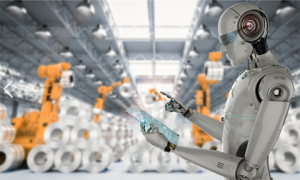
AI-Powered Industry Transformation: Enhancing Productivity, Quality, and Client Service
In today's dynamic business landscape, the convergence of Artificial Intelligence (AI) and robotics is catalyzing a profound transformation across industries. This paradigm shift, driven by AI technologies such as robotics, humanoids, and Large Language Models (LLMs), is not merely revolutionizing processes but redefining the very essence of productivity, quality, and client service. The manufacturing sector stands as a prime example of AI-driven automation's transformative potential. Robotic systems empowered with AI algorithms are orchestrating a metamorphosis on factory floors, seamlessly executing tasks that were once arduous and repetitive. These tireless AI-driven machines operate around the clock, ensuring unparalleled consistency and efficiency in production processes. Consider the automotive industry, where AI-powered robots meticulously assemble intricate components with surgical precision. Adaptable and agile, these robots swiftly accommodate changes in manufacturing processes, facilitating the seamless integration of new products and customization. This flexibility not only amplifies productivity but also empowers manufacturers to swiftly respond to shifting customer demands, thereby fostering customer satisfaction and loyalty. Meanwhile, in the service sector, humanoid robots are revolutionizing client interactions. These sophisticated AI entities engage with clientele in a manner that is not only natural but also profoundly enriching. Picture hotels and restaurants employing humanoid robots as adept concierges and servers, delivering personalized services and recommendations with finesse. By harnessing AI capabilities, these humanoids comprehend and respond to customer queries adeptly, ensuring round-the-clock efficiency and courtesy. This not only elevates customer satisfaction but also liberates human employees to focus on tasks that demand human creativity and empathy. Moreover, the advent of Large Language Models (LLMs) such as GPT-3 heralds a new era of data analytics and decision-making prowess. These behemoths of computational linguistics possess an unparalleled capacity to sift through vast troves of textual and numerical data, uncovering invaluable insights and patterns imperceptible to human analysts. In domains like finance, LLMs are indispensable for sentiment analysis, risk assessment, and market prognostication. By scrutinizing market trends, news feeds, and social media chatter, LLMs furnish real-time insights, empowering businesses to make judicious decisions and maintain a competitive edge.
The manifold benefits of AI-driven industry digitization and process automation extend beyond mere operational enhancements. They encompass: Improved Productivity: AI-powered automation accelerates task execution and slashes operational costs, engendering heightened production rates and efficiency gains. Enhanced Quality: Automation engenders uniform quality control, curbing errors and defects, thereby bolstering customer satisfaction and loyalty. Personalized Service: Humanoid robots and AI-driven chatbots proffer bespoke recommendations and support, augmenting client experiences and fortifying brand allegiance. Cost Savings: By automating routine tasks and streamlining processes, businesses curtail operational overheads, enabling cost savings that can be reinvested in innovation or passed on to clients. Competitive Advantage: Embracing AI technologies positions businesses at the vanguard of innovation, conferring them with a competitive edge in fiercely contested markets.
Nevertheless, as we journey into this AI-infused future, it is incumbent upon us to address the ethical and environmental implications inherent in AI adoption. Environmental Sustainability: While AI fosters productivity, its voracious energy consumption warrants scrutiny. Businesses must couple AI expansion with energy-efficient practices to mitigate its ecological footprint. Responsible AI: The development and deployment of AI systems must adhere to rigorous ethical standards to preclude bias, discrimination, and privacy infringements. Ensuring AI's equitable distribution of benefits is imperative to foster societal harmony and inclusivity.
In summation, AI-driven industry digitization and process automation represent an epochal leap towards a future characterized by enhanced productivity, quality, and client service. By conscientiously harnessing AI's transformative potential in robotics, humanoids, and LLMs, businesses can architect a future that is not only more efficient but also more equitable and sustainable, thereby delivering unparalleled value to their clients and stakeholders alike.
